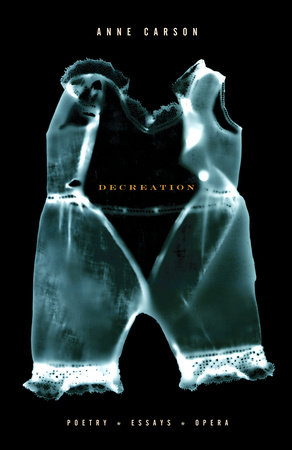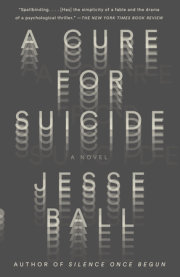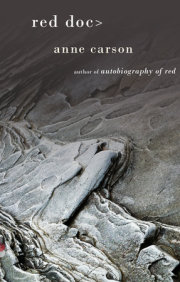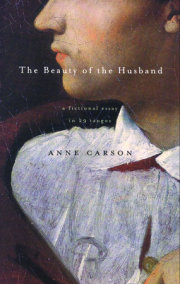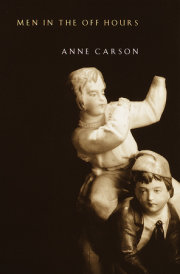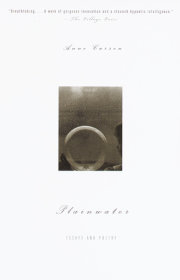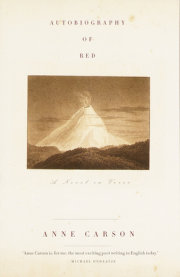In her first collection in five years, Anne Carson contemplates “decreation”—an activity described by Simone Weil as “undoing the creature in us”—an undoing of self. But how can we undo self without moving through self, to the very inside of its definition? Where else can we start?
Anne Carson’s Decreation starts with form—the undoing of form. Form is various here: opera libretto, screenplay, poem, oratorio, essay, shot list, rapture. The undoing is tender, but tenderness can change everything, or so the author appears to believe.
“In 13 intricately related, supple and confident works in verse and prose, eminent poet and classicist Carson takes on the meaning and function of sleep; the art and attitudes of Samuel Beckett; the last days of an elderly mother; guns; a solar eclipse; ‘Longing, a Documentary’; the films of Michelangelo Antonioni; and the vexing, paradoxical projects of women mystics, among them Simone Weil and medieval heretic Marguerite Porete . . . Brilliant, unusual.” —Publishers Weekly
“One of the most interesting gatherings of material that any poet has published within living memory . . . Carson’s tone is light, teasing, and playful. In a voice of near childlike innocence, she asks extraordinarily difficult and searching questions about the nature of sleep and the idea of sacredness and the soul. She teases the reader intellectually rather in the way that Gertrude Stein used to tease, by a strange use of repetition, and by often using silliness as a route to the exploration of seriousness. She is quite unlike any other poet writing today.” —The Economist
“What Walden Pond was to Thoreau, what the sea was to Conrad and Melville, what seeing is to John Berger, Greek and Latin are to Anne Carson: an immense space–because the words now contain the world that once existed around them–that allows her imagination a measureless boundary . . . Glass, Irony and God, one of the finest debut books of poetry published in English in the twentieth century, was written with an almost inconceivable urgency and power . . . It is difficult to think of Carson apart from her sources and subjects, which are never more powerfully on display than in her new book, Decreation. It’s a kind of Anne Carson Reader–populated with such icons as Simone Weil, Virginia Woolf, Marguerite Porete, and Michelangelo Antonioni–and her most cohesive, integrated book since Glass, Irony and God . . . Carson’s poetry and prose, scholarly and intrepid, move with an almost unparalleled swiftness among myths, ancient languages, and contemporary life, casting a semiological eye on those things that exemplify our culture’s obsession with surfaces. [Her] work brings readers to a mediated but unmitigated place where men and women, with the stress on the latter, are enmeshed in nature, as in The Metamorphoses. An implacable victimization is active in her work, yet these tortuous turns are also seen coolly as the price of being alive; and her ‘ecstasy,’ a subject she reinvestigates in Decreation, allows her to stand outside herself and present these examples–this slide show of her icons–to her readers . . . Carson has the ability to isolate details so that a few lines of poetry can carry the weight of a short story . . . In Decreation, when she clears a path to the sublime, it rages, froths, and foams; it is informed by an energy verging on madness. [A] wide and wild variety of texts . . . If anyone knows how to be alluring, it is Carson . . . Affecting, fascinating, remarkable, beautiful, stimulating in a way that is manifestly taut and poetic, pitch-perfect, disarming.”—Mark Rudman, BookForum
“For the past two decades, Canadian classics professor and international poetry phenom Anne Carson has produced a diverse body of work . . . Carson’s work has never fit into any ready-made category. Decreation, her latest, is no exception . . . Carson’s core subjects have remained big and intense–love, God, death, beauty, truth, desire. But even when she’s quoting Aristotle, Carson’s work rarely comes off as academic pyrotechnics or rococo wank-offery. Rather, she uses her scholarship to help us figure out why love is so hard, and the role death plays in life . . . Carson evokes an idea and then settles in to explore it from a variety of angles . . . What is often surprising is that Carson doesn’t limit herself to Classical thought. She not only acknowledges that popular culture exists–which already distinguishes her from most contemporary poets–but is also inspired by it and integrates it into her classical world. This enriches her language immensely . . . Winning, heartbreaking . . . As Carson mixes new and old worlds, she makes the big ideas she tackles relevant to our own lives . . . The book deserves wide attention. At its best, it’s Marlene Dietrich meets Gertrude Stein set to a Frances Lai soundtrack. Her many fans, from both L Word and academic contingents, should find much to enjoy.”—Daniel Nester, Time Out New York
“Count on Carson, brilliant and larky, to dance you out of the quotidian. A frolicsome and philosophical poet who channels voices both mythic and historical as she opens new portals onto the human psyche, Carson tinkers expertly with form and complex concepts in her ninth highly original book . . . Carson is at her electrifying best when she pairs incisive essays with piercing poems to explore the magical properties of seep, to explicate the sublime . . . and to grapple with ‘spiritual daring’ . . . Carson’s inquiry into the paradoxical ‘decreation’ of the self in the quest for the divine exemplifies her gift for joining erudition with feeling, insight with wit, and a sense of cosmic continuity with personal liberation . . . Commanding.” —Donna Seaman, Booklist

